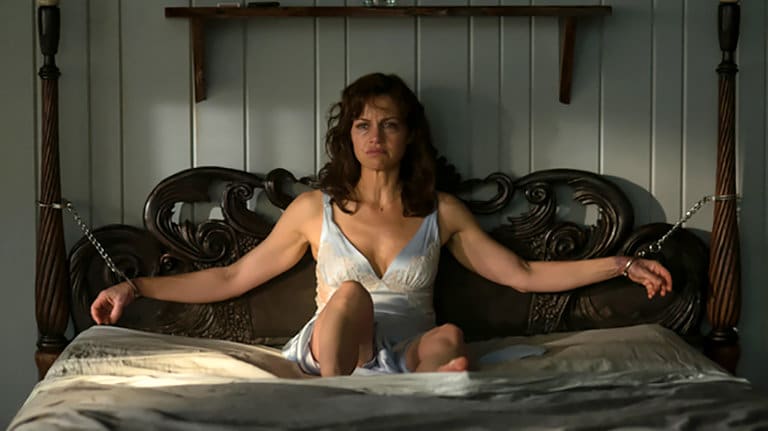For anyone who keeps up with the contemporary film scene, there’s really no getting around the somewhat eerie prescience of Gerald’s Game landing on screens at this moment. It’s not just that it’s the latest high profile Stephen King adaptation during something of a renaissance for the famed author’s works on screen, landing in the wake of the massively successful It and the somewhat less successful The Dark Tower, not to mention the recently axed TV series of The Mist. Considerably more so than this, it’s the core themes of King’s 1992 novel – brilliantly adapted by one of the finest filmmakers working in horror today, Mike Flanagan – that really resonate in the current climate. On the one hand, we could call Gerald’s Game a simple survivalist tale, centred on one woman trapped alone in a single location facing certain death, and in that respect it’s not too far removed from Flanagan’s earlier film Hush; but crucially – indeed, inescapably – Gerald’s Game is a story about the suffering of women at the hands of abusive, manipulative men. And if you need filling in as to why this is particularly relevant now, this article is as good a place as any to start.
 Jessie (Carla Gugino) is taken by her husband Gerald (Bruce Greenwood) up to their idyllic, remote holiday home by a lake. The plan, it seems, is for the couple to get away from the hustle and bustle of their metropolitan lives and spend some real quality time alone. Of course, this doesn’t mean they intend to walk on the beach and be one with nature or any of that nonsense; nope, this means the plan is to rekindle the flames of carnal desire between the two of them. And in his advancing years, it seems Gerald needs a little bit extra to rev his engine these days, not just in the form of Viagra (not an aspect of King’s 1992 novel, obviously as it wasn’t a thing just yet), but also by playing a bit of kinky role play and bondage with his apparently willing wife. For this special occasion, Gerald’s gone all out, advancing from the classic silk scarves to bona fide police grade handcuffs with which he restrains Jessie on the bed. However, as the game begins, it quickly becomes clear that Jessie isn’t comfortable, and the ensuing argument ends in the worst possible way: Gerald is suddenly struck down by a massive heart attack, and drops dead, leaving Jessie trapped, with seemingly no means of escape, and no neighbours for miles around – with the exception of one hungry-looking stray dog.
Jessie (Carla Gugino) is taken by her husband Gerald (Bruce Greenwood) up to their idyllic, remote holiday home by a lake. The plan, it seems, is for the couple to get away from the hustle and bustle of their metropolitan lives and spend some real quality time alone. Of course, this doesn’t mean they intend to walk on the beach and be one with nature or any of that nonsense; nope, this means the plan is to rekindle the flames of carnal desire between the two of them. And in his advancing years, it seems Gerald needs a little bit extra to rev his engine these days, not just in the form of Viagra (not an aspect of King’s 1992 novel, obviously as it wasn’t a thing just yet), but also by playing a bit of kinky role play and bondage with his apparently willing wife. For this special occasion, Gerald’s gone all out, advancing from the classic silk scarves to bona fide police grade handcuffs with which he restrains Jessie on the bed. However, as the game begins, it quickly becomes clear that Jessie isn’t comfortable, and the ensuing argument ends in the worst possible way: Gerald is suddenly struck down by a massive heart attack, and drops dead, leaving Jessie trapped, with seemingly no means of escape, and no neighbours for miles around – with the exception of one hungry-looking stray dog.
Considering the novel’s a full 25 years old, and vast swathes of King stories have been adapted for the screen in that time, it seems quite remarkable that it’s taken this long for Gerald’s Game to get the movie treatment – but I think we can be very thankful for that. I shudder to think what the results would have been like had anyone tried to film it in the 1990s; in the wake of Basic Instinct, it almost certainly would have been geared as a sordid erotic thriller. Thankfully, Mike Flanagan and his co-screenwriter Jeff Howard are much too smart to take that route. While I can imagine that some purists and/or perverts will bemoan the fact that Gugino is not naked for the duration as in the book, this is the only major deviation, the film staying true to the novel’s central focus on the protagonist’s mental struggles as she tries to think her way out of her dire situation. The main way in which Jessie processes her trauma is with mental projections of both the dead Gerald and an externalised version of herself; as a result long sections of the film are based on conversations between Greenwood and the two Guginos, all whilst another Greenwood lies rotting on the floor, slowly being eaten by a dog.
Written down like that, you’d be forgiven for anticipating a thoroughly sensationalist schlock horror with overtones of black comedy, but the truly remarkable thing is that Flanagan’s direction always keeps things surprisingly grounded and sober. Yes, the leads are scantily clad throughout (and both in amazing shape – male and female viewers alike, prepare to have Carla Gugino arm envy); and yes, there are some very grisly moments. Yet it never feels exploitative, even in its most extreme moments. And let there be no mistake, Gerald’s Game gets pretty extreme at times. I haven’t seen a film that’s made me wince so hard for some time. As his previous films have demonstrated, Flanagan is capable of showing remarkable restraint, whilst at the same time not leaving the shock-hungry gorehounds feeling short-changed, and this, I think, is why he really is one of the best in the business right now.
However, the real gut-punches in Gerald’s Game are not the splashes of viscera, as gruesome as they may be. This is a story that deals with real trauma buried deep in the subconscious of a troubled woman, and it’s in delving into this that the film really gets under the skin, in a manner which is liable to push a great many viewers out of their comfort zone. However, as I said coming in, this is a story that I think needs to be told right now, particularly to the men among us. As recent events have shown, the mistreatment of women – and the all-too frequent lack of consequences for abusive men -remains a huge problem that needs to be addressed, even among us allegedly progressive cineaste types. As much as Gerald’s Game will no doubt present much which women can relate to, so too does it confront men with aspects of our behaviour we might not like to admit to – and, here’s hoping, it may open some eyes to the need for change.
I haven’t seen The Dark Tower at the time of writing, but even so – and after thoroughly enjoying It – I feel confident in declaring Gerald’s Game the best Stephen King adaptation of the year. On top of which, it goes that bit further to confirming that Mike Flanagan is a director who’s truly at the top of his game. Even so, this does raise the point that it’s rather a pity his film has to skip cinemas entirely in favour of going direct to Netflix, but that’s a whole other debate for another time…
Gerald’s Game is available to view now on Netflix.
